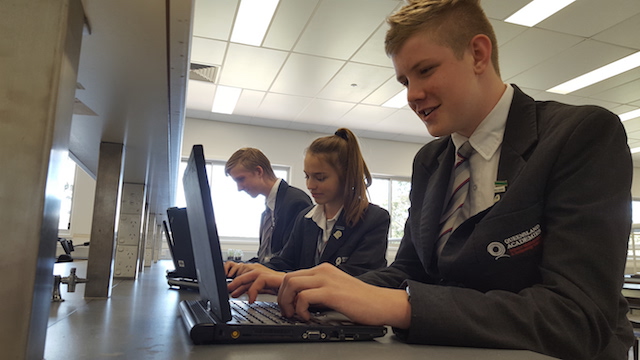
Each year since 2014, UQ and RCC have sponsored high school students from Brisbane’s Queensland Academy for Science, Mathematics and Technology or Faith Lutheran College (Redlands) to attend the international Supercomputing Conference. They join students from Melbourne’s John Monash Science School at the event.
Below, QASMT computer science teacher Donald May describes how the students who attend the conference continue applying their experience throughout the year.
RCC Director Prof. David Abramson said: “I can’t wait to see where these students go next. They are clearly setting their sights on the future.”
This year students from the Queensland Academy for Science, Mathematics and Technology (QASMT) will be lucky enough to again attend the world’s largest supercomputing conference, SC17, this year to be held in Denver, Colorado, 12–17 November. This has been made possible with the generous support of the University of Queensland’s Research Computing Centre and inspired by its Director, Professor David Abramson.
Since 2014, nine QASMT students have been fortunate enough to be selected to attend the SC conference, where they have been excited by the field of supercomputing, learned about career possibilities and available technologies, and made contacts with successful people in the field of supercomputing and research.
Outside of the conference, students from the John Monash Science School, Faith Lutheran College (Redlands) and QASMT have been collaborating on learning projects within their high performance computing (HPC) clubs for the last three years.
In 2015, the school HPC clubs worked collaboratively on a weather sensing and data collection project to compare weather and weather patterns between each of the three schools. Data collected in this project included temperature, pressure and humidity.
In 2016, the HPC clubs investigated sensor and data collection within open-plan buildings at each of the three school campuses to compare teaching and learning spaces. Data collected in this project included temperature, humidity and light.
The projects in 2015 and 2016 were focused on collecting data for the purpose of collation and making a data set which could be used to practice skills and further the students’ knowledge in the field of ‘big data’.
In 2017, students in the schools’ HPC clubs have been learning about parallel processing and parallel programming in order to make sense of, and to utilise, ‘big data’. The students at QASMT have been learning C/C++, OpenMP and MPI as the first step to understanding parallel programming and gaining knowledge and skills in the field of HPC.
Attending SC17 will allow students from the QASMT HPC club to deepen their understanding of supercomputing, as well as further their knowledge of the technologies, careers and current projects being completed in the field of supercomputing.



